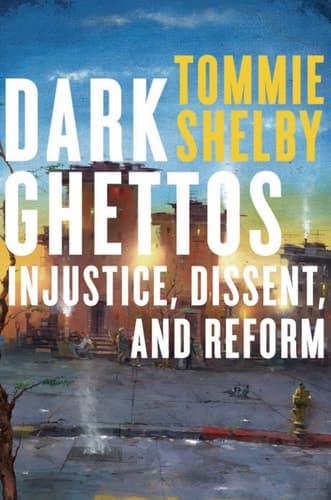
About this book:
Winner of the Spitz Prize, Conference for the Study of Political Thought Winner of the North American Society for Social Philosophy Book Award Why do American ghettos persist? Scholars and commentators often identify some factor—such as single motherhood, joblessness, or violent street crime—as the key to solving the problem and recommend policies accordingly. But, Tommie Shelby argues, these attempts to “fix” ghettos or “help” their poor inhabitants ignore fundamental questions of justice and fail to see the urban poor as moral agents responding to injustice. “Provocative…[Shelby] doesn’t lay out a jobs program or a housing initiative. Indeed, as he freely admits, he offers ‘no new political strategies or policy proposals.’ What he aims to do instead is both more abstract and more radical: to challenge the assumption, common to liberals and conservatives alike, that ghettos are ‘problems’ best addressed with narrowly targeted government programs or civic interventions. For Shelby, ghettos are something more troubling and less tractable: symptoms of the ‘systemic injustice’ of the United States. They represent not aberrant dysfunction but the natural workings of a deeply unfair scheme. The only real solution, in this way of thinking, is the ‘fundamental reform of the basic structure of our society.’” —James Ryerson, New York Times Book Review
Recommended in:
- Best Of: A Revelatory Tour of Martin Luther King Jr.’s Forgotten Teachings (Jul 4, 2023) with Brandon Terry
- A Revelatory Tour of Martin Luther King Jr.’s Forgotten Teachings (Jan 16, 2023) with Brandon Terry
Recommended with:

Where Do We Go from Here: Chaos or Community? (King Legacy)
Dr. Martin Luther King Jr.

The Trumpet of Conscience (King Legacy)
Dr. Martin Luther King Jr.

The Sword and the Shield
Andrew, Christopher, Mitrokhin, Vasili

A More Beautiful and Terrible History: The Uses and Misuses of Civil Rights History
Jeanne Theoharis

A Time to Break Silence: The Essential Works of Martin Luther King, Jr., for Students (King Legacy)
Dr. Martin Luther King Jr.

From the War on Poverty to the War on Crime: The Making of Mass Incarceration in America
Elizabeth Hinton